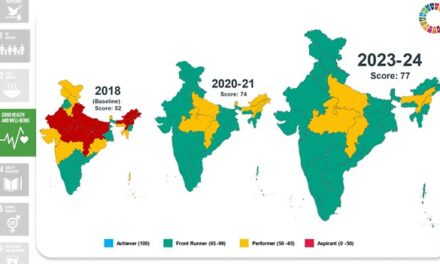A Significant Step toward Global Integration of Traditional Medicine: Secretary Ayush
In a significant milestone for the global recognition of traditional medicine, the World Health Organization (WHO) has announced the 2025 update to the International Classification of Diseases (ICD-11). The update introduces a pioneering new module dedicated to traditional medicine conditions, marking a monumental step in the systematic tracking and global integration of traditional systems of healthcare practices related to Ayurveda, Siddha, and Unani.
This update follows a year-long testing and deliberations after the launch of ICD-11 TM-2 (on January 10, 2024, in New Delhi) for Ayurveda, Siddha, and Unani systems of medicine for country implementation testing. It culminated in the deliberations held at the WHO meeting at the National Institute of Health in Malaysia in November 2024. The ICD-11 TM 2 module is now officially released on the ICD-11 Blue Browser of WHO.
This groundbreaking inclusion of traditional medicine in WHO’s internationally recognized health framework ensures that the traditional health systems of Ayurveda, Siddha, and Unani are officially documented and categorized in ICD-11, alongside conventional medical conditions. This elevates their status in global health reporting, research, and policymaking.
Vaidya Rajesh Kotecha, Secretary, Ministry of Ayush, stated, “The release of the ICD-11 update 2025 represents a significant step toward global integration of traditional medicine, specifically Ayurveda, Siddha, and Unani. By allowing dual coding and improving data collection, this update fosters evidence-based policymaking, enhances patient care, and supports the inclusion of traditional medicine in national healthcare strategies, promoting holistic and inclusive healthcare worldwide. This update also marks a pivotal moment for traditional medicine, paving the way for its global integration and empowering evidence-based integrative healthcare policies that embrace holistic well-being.”
“With the new updates, the ICD-11 offers more ease of use, improved interoperability, and accuracy, which will benefit national health systems and the people they serve,” said Dr. Robert Jakob, Team Leader, Classifications and Terminologies Unit, WHO.
Ayurveda, Siddha, and Unani: A New Global Platform
Traditional medicine has long been an essential component of healthcare, particularly in Asia, Africa, and other regions where indigenous practices complement modern medical approaches. The introduction of the ‘Traditional Medicine Conditions’ module in ICD-11 is a major step toward acknowledging the vital role of Ayurveda, Siddha, and Unani in the modern healthcare landscape. This move aligns with WHO’s mission to promote universal health coverage and sustainable development goals, recognizing the therapeutic potential of these systems alongside contemporary medical treatments.
This new module allows healthcare providers to use dual coding for both traditional and conventional medicine diagnoses, enabling comprehensive data collection on the use and effectiveness of traditional medicine practices. By formally categorizing these systems, WHO is facilitating a structured way for researchers, policymakers, and healthcare providers to systematically track and assess the impact of traditional medicine in health systems worldwide.
Empowering Global Research and Evidence-Based Policy
Including traditional medicine within ICD-11 offers a host of advantages for global healthcare. By providing standardized terminology and definitions, the module will:
- Enhance data collection: Enabling the global tracking of traditional medicine usage, ensuring comprehensive reporting of its application.
- Facilitate evidence-based policymaking: Supporting the integration of traditional medicine into national healthcare strategies, ensuring its contribution to global health priorities.
- Improve patient care: Allowing healthcare providers to incorporate traditional medicine practices into clinical decision-making for more holistic treatment plans.
- Boost global comparability: Providing a framework for researchers to analyze the efficacy of traditional medicine alongside modern medical treatments.
By systematically documenting traditional medicine practices, WHO has created a platform for enhancing both the visibility and credibility of Ayurveda, Siddha, and Unani on the world stage.
A Step Forward for Ayurveda, Siddha, and Unani
Ayurveda, Siddha, and Unani are centuries-old healthcare systems that have served as the cornerstone of healthcare for millions of people in India and beyond. Their formal recognition in ICD-11 offers a powerful opportunity to showcase these systems as integral components of holistic healthcare.
This inclusion enhances the global recognition of these practices and underscores their relevance to universal health coverage and broader health equity efforts. It marks a shift toward inclusivity, with traditional medicine now positioned alongside modern medicine in global health dialogues.
Strengthening Traditional Medicine’s Role in Healthcare
The traditional medicine module in ICD-11 is designed to capture morbidity data rather than mortality, and will help governments and healthcare institutions assess the frequency, quality, and cost-effectiveness of traditional medicine interventions. This evidence-based approach will allow policymakers to make informed decisions about the integration of traditional medicine services into national health frameworks.
As more people turn to traditional medicine alongside modern medical treatments, WHO’s initiative reflects its commitment to ensuring that all forms of healthcare—both modern and traditional—are accounted for in public health strategies. By incorporating traditional medicine into ICD-11, WHO is not only fostering inclusivity but also advancing evidence-based healthcare solutions for diverse populations.
The inclusion of Ayurveda, Siddha, and Unani within ICD-11 marks a turning point in how the world views and integrates traditional healthcare systems. With global research, policy formulation, and healthcare practices increasingly influenced by evidence-based approaches, this historic update is set to reshape the future of traditional medicine, ensuring its continued relevance in modern healthcare systems worldwide.
Disclaimer: This article is for informational purposes only and does not constitute medical or policy advice. The inclusion of traditional medicine in ICD-11 reflects WHO’s commitment to global health data integration but does not imply an endorsement of any specific treatment or practice. Readers are advised to consult healthcare professionals for medical guidance.












